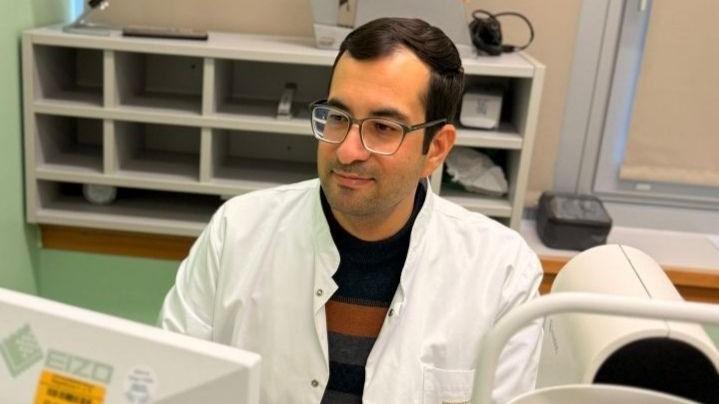From CUAS to Harvard – let’s look at the highlights of the post-graduation journey of Dietmar Wohlbauer, who focused his career on the development of cochlear implants.
Please provide us with a brief overview of your journey since graduating, including your career
My research interest was sparked during the CUAS Master’s program and an exchange at the University of Southern California and the Institute for Creative Technologies in Los Angeles, where I had the opportunity to combine my interest in acoustics and sound perception into my Master’s project. After finishing my studies, I got the opportunity to join the Laboratory for Experimental Audiology at the University Hospital Zürich for a PhD in Neuroscience, in particular Cochlear Implants, where I was able to extend my skills in the field of hearing research. In the following years, I developed a cochlear implant coding algorithm to improve spatial perception for severe to profound hearing-impaired individuals. After finishing my PhD, I decided to go to Norway for a postdoctoral fellowship at the Technical University in Trondheim to do research and lecture what I had learned about cochlear implants. After one year in the northern wilderness, I took the opportunity to swap nature for pure science at Harvard University and the Massachusetts Eye and Ear Hospital in Boston, USA. Back in the laboratory with hearing-impaired individuals, I am now working on improving cochlear implant coding strategies once more to tackle the challenge of hearing impairment.
Can you share a bit of your CUAS story? What made it special for you?
The years at the CUAS were great! I learned the necessary skills to start my career, and not to forget, made friends for life! When I started my studies, I did not know the direction to go, however, I was always eager to learn about new things and explore new directions and places, and CUAS was a great place to receive the necessary support. The existing network between companies and the MedIT study program motivated me to reach out to interesting companies where I could learn how to utilize what I have studied in the classroom. With my acquired knowledge, I was able to integrate easily, not only on a professional level but also personally. The evenings in the lab working on new challenges and their solutions together and on my own definitely paid off!

How did it shape your path after graduation?
Throughout my studies, I made great connections that formed my current career path. I enjoyed the academic environment and, therefore, decided to pursue my studies by joining a research laboratory in Zürich, where I could finally concentrate my knowledge on one single project. After the first insights on how to approach problems and apply the theoretical knowledge during my studies in the MedIT program, I was now challenged to find my own solutions to never-before-explored ideas. I got the opportunity to work at the cutting edge of technology and I am still here today, excited every day of the wide range of possibilities.
What is your current position? Can you explain your work in Boston?
I am currently continuing my pathway in academia at Harvard University and the Massachusetts Eye and Ear Hospital in Boston, USA, where I work on the technical and physiological aspects of hearing loss and how to effectively translate or code signals for severely impaired individuals who received a cochlear implant. Cochlear implant coding is one major challenge in hearing implant research. Responsible for the translation of sound from the acoustic domain into electrical signals, there are hundreds of ways to process signals and present them to the cochlear implant user. In my PhD, I started to explore implant processing and how electric signals can preserve the accuracy of acoustic sounds, which is still one of my main interests today as a postdoctoral researcher. The field of hearing impairment is broadly spread from understanding the acoustic environment surrounding us to neuroscience and how the brain interprets sound. Challenging in many aspects, there are numerous directions to approach hearing impairment, and I am happy to be part of this exciting journey.
Would you recommend studying at CUAS and if yes, why?
I can recommend studying medical technologies in the environment of the Carinthia University of Applied Sciences. Applying theoretical knowledge on the spot is a valuable possibility during your studies and as soon as leaving the classroom for your next career step. No matter where you go afterwards, deeply understanding the existing technology of today will help to improve it for tomorrow, and I hope you will enjoy it as much as I did.
Yours,
MedTech @ FH Kärnten Team



